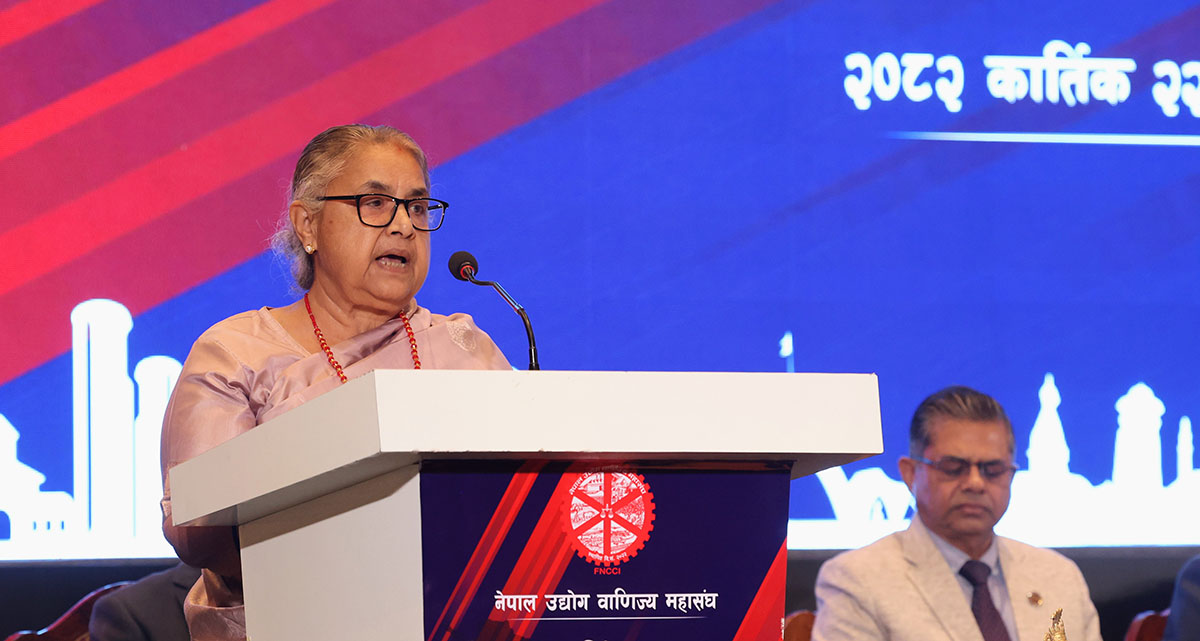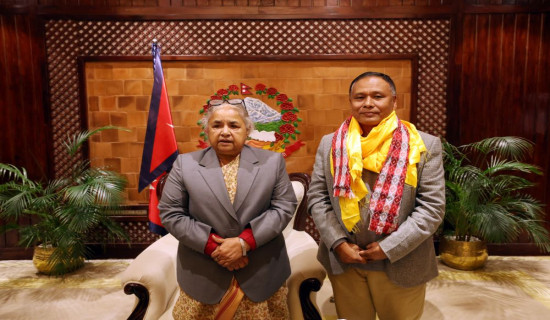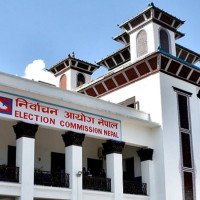- Thursday, 8 January 2026
Govt assures private sector of investment security
Kathmandu, Nov. 9: The government has assured the private sector, which experienced a severe attack and damage to business and private properties during the Gen Z movement in September, that investments and investors will be protected.
Speaking at the National Economic Dialogue 2.0 organised by the Federation of Nepalese Chambers of Commerce and Industry (FNCCI) in the Capital on Saturday, Prime Minister Sushila Karki, Finance Minister Rameshore Prasad Khanal, Home Minister Om Prakash Aryal and Industry Minister Anil Sinha uniformly appreciated the role of the private sector in the aftermath of the movement. They assured that policies would be enacted to facilitate and protect the businesses and industries.
Prime Minister Karki assured the private sector that their contribution to the economy and society would be aptly valued and utmost security would be provided to the investment. "The government and the private sector are the engine and fuel in a vehicle, so one compliments the other. Without one, the vehicle cannot move ahead," she said.
According to her, persecution of honest entrepreneurs and the protection of those who manipulate policies must not continue.
"We strongly condemn the damage caused to the industrial and business sectors by a few unruly groups taking advantage of a temporary state of power vacuum," she said while adding, "I would like to once again assure you that the government will leave no stone unturned in providing immediate relief and support to the private sector — just as it has done for the injured youths of the Gen Z movement — and in restoring their confidence."
The government is aware of the structural shortcomings in the economy, lack of job creation and capital flight. Upcoming policies will be built on these factors, she said.
Stating that the Gen Z movement clearly articulated that the youth will not tolerate corruption, bad governance, and looting in the name of democracy, PM Karki stated that the government would take every possible step to boost the confidence of the private sector. "For this, all the culprits that were involved in the vandalisation of private property and business on September 24 will be brought to the book. We are aware of the looting in the guise of politics," she said.
Likewise, she informed that the government is formulating strategy to harness the opportunities in hydroelectricity, agriculture and tourism sector and attract investment in these priority sectors. She also took the opportunity to call one and all to support in creating conducive environment for the upcoming election to the House of Representatives slated for March 5.
MoF to make swift decisions
Speaking on the occasion, Finance Minister Rameshore Prasad Khanal said that government's basic priority is private sector facilitation which has been initiated with the concessions and facilities announced in the aftermath of the September movement. "Revolutionary reforms at the customs administration are in the offing. Tax centres are being expanded to the local levels and, within a year, tax service will be available at every local body," he stated.
According to him, the Ministry of Finance wouldn't hesitate to make quick decisions on the matters related to the business, investment and economic growth.
"Wealth created by the private sector is also the property of the country. There is a need to educate people that the damage caused to the private property and business establishment is the damage made to the country," said Minister Khanal.
Home Minister Om Prakash Aryal said that the current priority is strict implementation of the rule of law and sending message to the people that they are safe. He stated that many of those attacking the business and private property have been arrested and the remaining ones will be booked soon.
"The government is in continuous contact with the stakeholders of the politics and economy and will devise better path and system for the future," he said.
Need to inspire future investors
Minister For Industry Commerce and Supplies Anil Kumar Sinha said that the government and ministries need to set the priorities to move ahead in order to achieve the desired results.
"My first priority as a minister is to extend service delivery to inspire the future generations that is joining the business.
Decision making process should be swift and pragmatic," he said. "But the very next day I assumed the position of Industry Minister, few entrepreneurs called me to offer their support, especially job to the families of those killed during the protest and other possible means. It has motivated me that we can have a collective effort in rebuilding the economy."
Chief Secretary Eak Narayan Aryal said that the government is yet to fully internalize the fact that the private sector is the major contributor to the economic growth and employment. "High government officials talk about the importance of private sector in public events but forget it while formulating policies and strategies," he said.
But still the business community has left the issues of damage during the protest in September and begun to talk about the positive aspects which will contribute positively to credit rating of the country, said Aryal.
The chief secretary also said that poor coordination among the three levels of the government has created hurdles and troubles for the investors and entrepreneurs.
Governor of the Nepal Rastra Bank Dr. Bishwo Poudel urged businesspeople and all to have a positive mindset and talk about positive aspects of the economy and financial markets. "If we continuously say the stock market will go down, it might actually go down. Let's not make self-fulfilling prophecies to actually happen," he said.
He also said that in the first phase the country needs to finalise the growth drivers, then develop strategies to work on them.
Need for special initiative
FNCCI President Chandra Prasad Dhakal said that the private sector expected a special initiative from the government to raise the dwindling confidence of the private sector. Security of investment and investors and speedy service delivery from all concerned authorities should be the primary step towards it.
"Even the bedrooms of businesspeople have been vandalised and looted during the Gen Z demonstrations in September, which has badly shaken their confidence," he said. He suggested the establishment of Private Sector Protection and Promotion Programme (PSPPP) to ensure that no form of attack is carried out against the private sector, and that swift services and facilities are provided in an integrated manner by all relevant agencies with the necessary security arrangements.
Dhakal also expressed ire that the private sector has long been portrayed as a profit-monger sector while they provide service to earn the profits. The private sector has more than 81 per cent contribution to the national economy and 86 per cent in the total employment. They conduct the export trade and earn foreign currency.
"I would like to remind you that in the aftermath of the COVID-19 pandemic, revenue collection had exceeded budget estimates. We have been fulfilling our duties," said Dhakal.
However, according to him, the government has listened to the concerns and demands of the private sector regarding the trunk line and dedicated feeder dispute. The FNCCI wants to settle the dispute amicably. He suggested that business renewal shouldn't be made mandatory for an enterprise that is regularly paying the taxes.
Need for long-term protection plan
President of Confederation of Nepalese Industries Birendra Raj Pandey said that investment should be taken seriously because an investor has calculated multiple risks before putting in the money in any business.
According to him, long-term industrial protection plan should be formulated at the earliest, attackers on private property should be brought to book, public services should be fully digitalised. "Nepali private sector has high resilience and has sprung back from many disasters. So, we will rise again. The government must facilitate in the process," he said.
Vice President of Nepal Chamber of Commerce Surendra Sharestha said that the private sector's decreasing confidence has resulted in growing liquidity in the financial system, and decreasing investment, production and exports.
The government should promote secure environment, concessional finance and technical facilitation to the businesses, he said.












-original-thumb.jpg)



